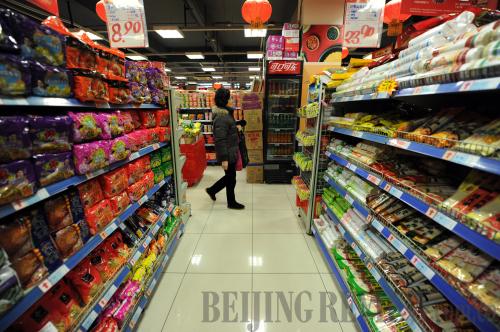|
 |
|
FINDING THE CHEAPEST: A customer selects goods at a supermarket in Hangzhou, Zhejiang Province (JU HUANZONG) |
After reaching a record high of 6.5 percent in July 2011, China's consumer price index (CPI) began to decline. According to the National Bureau of Statistics (NBS), the CPI rose 4.1 percent in December 2011 from a year earlier, which was 0.1 percentage point lower than the growth in November. It was the fifth month the year-on-year CPI growth dropped, indicating that China's anti-inflation measures have taken effect.
Although inflation's impact on the macro-economy continues decreasing, China still faces serious pressure from price hikes.
To cope with the inflation, the Chinese Government implemented a number of measures. During the first seven months of 2011, the central bank increased the reserve requirement ratio six times and raised the interest rate three times.
After these measures, the anti-inflation campaign achieved some effect: The CPI growth began to slow down since August last year.
Zhou Jingtong, senior economic administrator of the Institute of International Finance of the Bank of China, said three factors pushed up prices in 2011: The capital injection used to cope with the global financial crisis have pushed up prices since 2010; U.S. quantitative easing caused increases of commodities prices in the international market; and the rise of domestic labor costs.
Zhou said decreasing prices are the result of both the market and macro-control. At present commodities prices in the international market are dropping, fears over imported inflation are dying and growth of non-food prices in China is dropping slightly.
A report released by the Financial Research Center with the Bank of Co-mmunications said based on the judgment that domestic and international raw material costs will continue to drop, the economic growth speed will slow, monetary policy will be difficult to control, grain prices will remain stable and pork prices will drop. It expects that China's pressure of price growth this year will be eased compared to 2011.
Lu Zhengwei, chief economist of the Industrial Bank Co. Ltd., said the CPI in January this year will remain unchanged or increase slightly from last December. Expectations hold that it will drop after February.
| 